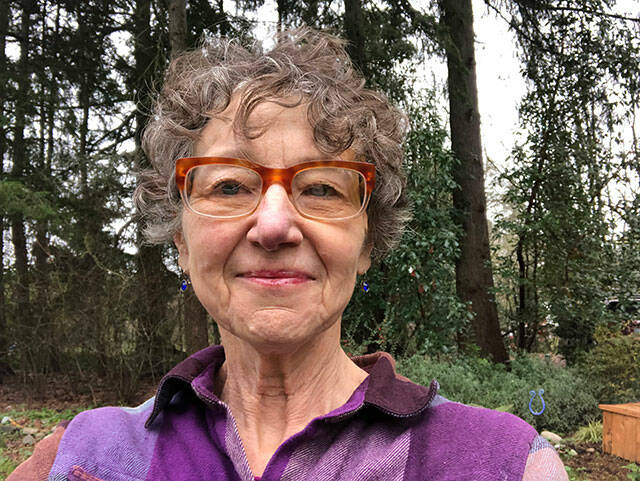“It was the best of times, it was the worst of times, it was the age of wisdom, it was the age of foolishness, it was the epoch of belief, it was the epoch of incredulity, it was the season of light, it was the season of darkness, it was the spring of hope, it was the winter of despair.” ‑ Charles Dickens, A Tale of Two Cities
So said Dickens in 1859 and so it seems today.
It is abundantly easy for people of conscience to identify with the horrors of our current world. But there is also the amazing courage of people around the world who persevere in their commitment to truth and justice.
Last month, 80 islanders participated in a Zoom presentation by the Seattle-based Civic Reparations Project, which can be viewed at tinyurl.com/mryeva8v. Part of the journey for many of us is recognizing the acts and impacts of our country’s treatment of Indigenous and Black peoples. This presentation was an important step for me in understanding the concepts of reparations and finding a path to action.
That is the purpose of this commentary — to invite people of conscience to explore how we as individuals can do what is right.
We live on land that was the homeland of the sx̌ʷəbabs Coast Salish Native People who were forcefully removed from this land and relocated to Fox Island after the Treaty of Medicine Creek. All across North America, tribes of people were brutalized, massacred, forcefully deprived of their homelands and livelihoods. Most children from the Salish Sea regions were removed from their families and placed in boarding schools. There they were made to give up their native cultures and languages. Many died and were buried in unmarked graves. These are acts of cultural genocide.
To support the early US economy, Black people were kidnapped and brought from Africa in chains. Enslaved, they were treated as chattel, with no human or civil rights. At the end of the Civil War, 4 million freed slaves were promised “40 acres and a mule.” Instead, $3 trillion of land was given to men who were enslavers, largely as reparations for their “lost property.”
After WWI, 1.2 million Black veterans were systematically excluded from the GI Bill of Rights. The trauma and repercussions of this history have led to grossly disproportionate rates of unemployment, homeownership, incarceration and health disparities amongst Black and Indigenous peoples. Systematic racism was and is allowed to flourish in our country.
These are parts of the “worst of times.” Here is what may become the “best of times” in my lifetime: there is a growing awakening as to what needs to be done.
We know that it is necessary to learn this history so that we can move beyond denial and shame and become true allies in addressing these wrongs. We know that our future as a true democracy demands it. We are not powerless. There is a path that leads forward and reparations are part of this path.
The idea of reparations is complex. One perspective is that reparations are any resources targeted to repair or heal injuries from past harms. Along with direct benefits to individuals, reparations can be collective benefits to the community to create conditions for Black and Indigenous people to thrive. Some focus more specifically on the ability to own land and homes, allowing more economic well-being which is passed on generationally.
Reparations are relevant at all levels of our government, for organizations, and for individuals. The Civic Reparation Project believes that reparations are not donations but should be seen by white people as part of ongoing budgets.
Below are examples of ways that we can involve ourselves in reparations locally, right now.
The Civic Reparation Project supports payments to Seattle’s Africatown Community Land Trust. Their mission is to acquire, develop, and steward land in Greater Seattle to empower and preserve the Black Diaspora community. Find out more at africatownlandtrust.org.
The Vashon Island Unitarian Fellowship (VIUF) encourages monthly payments to Community Passageways in South Seattle, helping Black youth to leave gangs and benefit from education and jobs. Find out more at communitypassageways.org.
Real Rent Duwamish is a nonprofit that advocates and provides services for members of the Duwamish Tribe in Seattle, which has been denied federal recognition. Find out more at realrentduwamish.org.
On Vashon, groups are working with the Puyallup tribe and gaining information about the written and unwritten history of boarding schools. On Jan. 22, a workshop will be offered on Zoom to start the dialogue “Toward Right Relations with Native Peoples.” Find out more at tinyurl.com/2p97hxzn.
VIUF will offer a presentation on reparations as part of our service at 11 a.m. Sunday, Jan. 16, at viuf.org/sunday.
Citizen advocacy is also needed to pass:
■ H.R.40, to establish a Commission to study and develop reparation proposals for African Americans.
■ H.R. 1, For the People Act- a bill in the US Congress to expand and protect voting rights.
• Part two of President Biden’s Infrastructure Bill.
■ Formal recognition of federal tribes and treaties, such as the Duwamish in Seattle.
People on Vashon are clearly ready to learn and act. Let’s explore together how we as individuals can do what is needed and build the public will for reparations.
Reparations are an important focus of VIUF’s Social Justice Committee as well as the Vashon/Maury Chapter of Showing Up for Racial Justice. Robbie Rohr is the former executive director of the Vashon-Maury Community Food Bank. She has worked in leadership positions in human services, social justice and faith organizations for many years.



